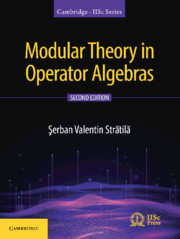Book contents
- Frontmatter
- Dedication
- Contents
- Preface to the Second Edition
- Preface to the First Edition
- Chapter I Normal Weights
- Chapter II Conditional Expectations and Operator-Valued Weights
- Chapter III Groups of Automorphisms
- Chapter IV Crossed Products
- Chapter V Continuous Decompositions
- Chapter VI Discrete Decompositions
- Appendix
- References
- Notation Index
- Subject Index
Chapter VI - Discrete Decompositions
Published online by Cambridge University Press: 16 October 2020
- Frontmatter
- Dedication
- Contents
- Preface to the Second Edition
- Preface to the First Edition
- Chapter I Normal Weights
- Chapter II Conditional Expectations and Operator-Valued Weights
- Chapter III Groups of Automorphisms
- Chapter IV Crossed Products
- Chapter V Continuous Decompositions
- Chapter VI Discrete Decompositions
- Appendix
- References
- Notation Index
- Subject Index
Summary
The Connes Invariant T(ℳ)
In this section, we introduce the invariant as the group of inner periods of modular automorphism groups on.
Let be a W*-algebra and the canonical quotient mapping. Recall (3.2) that the modular homomorphism defined by does not depend on the choice of the n.s.f. weight on and that is contained in the center of the group Out. Therefore, the kernel of the modular homomorphism is a subgroup of the additive group and an algebraic invariant of, which we denote by
Theorem. Let ℳ be a W*-algebra and. The following statements are equivalent:
(i) t ∈ T (ℳ);
(ii) for every we have Int;
(iii) for every there exists a unitary element such that;
(iv) for everythere exists a (strictly semifinite) commuting with such that
(v) there exists such that.
If ℳ is countably decomposable and, then
(vi) there exists a faithful normal state on with.
Proof. It is clear that (vi) ⇒ (iv) ⇒ (v) ⇒ (i) ⇒ (ii).
(ii)⇒(iii). If with, then for, whence. For, we have, so.
(iii) ⇒ (iv). By assumption, we have for some unitary. There exists a nonsingular positive self-adjoint operator A affiliated to such that. Then the n.s.f. weight commutes with and. On the other hand, we recall (10.9) that if, then the weight is strictly semifinite.
(iii) ⇒ (vi). Assume that is countably decomposable. By (iii) there exists an n.ss.f. weight on such that. Since is strictly semifinite and is countably decomposable, it follows by Theorem 10.9 that there exists a sequence with supports, mutually orthogonal, such that faithful normal state with.
Proposition. Let ℳ be a W*-algebra. If is semifinite, then. If and has separable predual, then is semifinite.
Proof. If is an n.s.f. trace on,for all, and. Conversely, if and is any n.s.f. weight on, then for all. If has separable predual, then, by Theorem 15.16, there exists an s-continuous unitary representation such that. Also, there exists a nonsingular positive self-adjoint operator A affiliated to such that and hence, for all, that is, is an n.s.f. trace on.
Thus, for any nonsemifinite W*-algebra ℳ with separable predual the center of the group Out(ℳ) is nontrivial.
Information
- Type
- Chapter
- Information
- Modular Theory in Operator Algebras , pp. 369 - 414Publisher: Cambridge University PressPrint publication year: 2020
